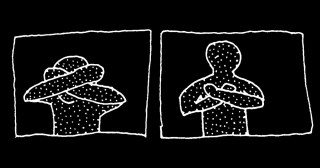Search results for “Why We write about ourselves”

Rilke on the Relationship Between Solitude, Love, Sex, and Creativity
“There is only one solitude, and it is large and not easy to bear… People are drawn to the easy and to the easiest side of the easy. But it is clear that we must hold ourselves to the difficult.”

Love and Symmetry: Poet A. Van Jordan Imagines the Undelivered Feynman Lecture About the Mystery Lying Between Scientific Truth and Human Meaning
“Mysteries inside mysteries in our own bodies of which we can’t make sense, another world waiting for a religion or calculus to explain.”

Why We Like What We Like: Poet and Philosopher George Santayana on the Formation and Confirmation of Our Standards and Sensibilities
“Half our standards come from our first masters, and the other half from our first loves.”

A Cat: Leonard Michaels’s Playful and Poignant Meditations on the Enigma of Our Feline Companions and How They Reveal Us to Ourselves
“If you think long enough about what you see in a cat, you begin to suppose you will understand everything, but its eyes tell you there is nothing to understand, there is only life.”

The Psychology of Social Rule: Pioneering Sociologist Elsie Clews Parsons’s Prophetic Century-Old Study of Power, the Rise of Divisiveness, and Why We Classify Ourselves and Others
“Classification is nine-tenths of subjection.”

Keith Haring on Creativity, Empathy, and What Makes Us Who We Are
“The need to separate ourselves and connect ourselves to our environment (world) is a primary need of all human beings.”

Mass, Energy, and How Literature Transforms the Dead Weight of Being: Jeanette Winterson on Why We Read
“Books read us back to ourselves… The escape into another story reminds us that we too are another story. Not caught, not confined, not predestined.”

Octavia Butler on Creativity, the Generative Power of Our Obsessions, and How We Become Who We Are
“Love quiets fear. And a sweet and powerful positive obsession blunts pain, diverts rage, and engages each of us in the greatest, the most intense of our chosen struggles.”

Leibniz’s Blades of Grass: The Philosophy of Plants, Difference as the Wellspring of Identity, and How Diversity Gives Meaning to the World
“The world… flourishes only in and as the variance among the beings that comprise it. Difference is at the origin of the world: it ‘worlds.’”



ABOUT
CONTACT
SUPPORT
SUBSCRIBE
Newsletter
RSS
CONNECT
Facebook
Twitter
Instagram
Tumblr